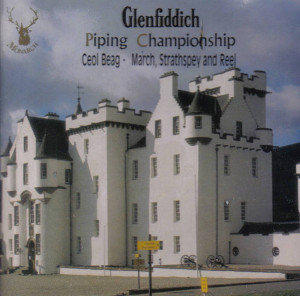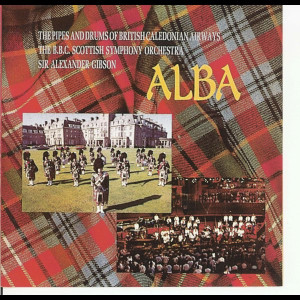Various artists’ Glenfiddich Piping Championship – March, Strathspey and Reel (Lismor, 1999)
Various artists’ Glenfiddich Piping Championship – Piobaireachd (Lismor, 1999)
Various artists’ Glenfiddich Piping Championship – Ceol Mor Piobaireachd (Monarch, 1991)
Various artists’ Dr Dan Reid Memorial Solo Piping Competition 1997 (SAF)
Various artists’ Dr Dan Reid Memorial Solo Piping Competition 1998 (SAF)
Various artists’ Dr Dan Reid Memorial Solo Piping Competition 1999 (SAF)
Various artists’ Dr Dan Reid Memorial Challenge Recital 2000 (SAF)
Various artists’ Tunes of Glory (Moidart, 1992)
Various artists’ The Amazing Amazing Grace and other Scottish Anthems (Lismor, 1992)
The Royal Scots Dragoon Guards’ Tunes of Glory (Lochshore, 1992)
Royal Ulster Constabulary’s Pipe Bands of Distinction (Monarch, 1991)
The Pipes and Drums of British Caledonian Airways’ ALBA (Lismor, 1996)
Cpl. Gordon Walker’s Pipers of Distinction (Monarch, 1992)
 The piping world is a law into itself. All over the world, enthusiasts have built up networks of shops, magazines, societies and radio shows such as BBC Radio Scotland’s “Pipeline” presented by Iain MacInnes of Ossian, to celebrate the piping world.
The piping world is a law into itself. All over the world, enthusiasts have built up networks of shops, magazines, societies and radio shows such as BBC Radio Scotland’s “Pipeline” presented by Iain MacInnes of Ossian, to celebrate the piping world.
The pipe bands themselves both keep the roots contact up and also add contemporary shadings, like their Breton counterparts’ experimentation with rock rhythm sections. This selection, however, deals with a more traditional approach to the pipe band style and sound. There isn’t an electric guitar in sight and superstar guests are obviously not invited – what we have instead is solid quality piping of the meat and two vegetable variety.
The annual pipe band competitions are a major event on the piping calendar. Bands practise the tunes and soloists enter for the combination of March, Strathspey and Reel and Piobaireachd competitions. The two Pipe Band Championships dealt with here are the Dr Dan Reid Memorial Solo Piping Competition and the Glenfiddich Piping Championship. Both of these competitions specialise in solo piping. Both collections involve mixing the piobracht with the march, strathspey, and reel, but while the Dr Dan Reid Memorial Competion discs mix both dance music and piobaireachd on each album, the Glenfiddich Competition discs devote full albums to each. The March Strathspey and Reel selection is very common in the piping repertoire for both bands and solo players. Lismor Records, in their series of recordings from the 25th annual Glenfiddich Piping Championship, devotes a full CD to various competitors letting loose on selections of March, Strathspey and Reels – including Dr. Angus MacDonald and Alastair Gilles, first prize winner overall. This is the lighter, more airy music of the pipes, and is easily assimimilated into the listening system. It offers a contrast to the stark sombre sounds of the the Piobaireachd.
The Piobaireachd is by far the most complex and individual of pieces within the piping repertoire. It is known as the Ceol Mor (or Big Music) – referred to as the classical music of the pipes, and spoken of the same way as chamber music is within orchestral circles. A Piobaireachd is basically an extended slow air or lament, which is broken down into a theme and series of variations. The theme piece is known as the Urlar, or “the ground”; a name taken from the Irish and Scots Gaelic word for floor.
The urlar acts as a basic outline of the tune, onto which are added a number of variations, until the final finished Piobaireachd piece comes out as a composite of both theme and variation. A single piece can run up to 20 minutes in length. This renders it similar to the epic Child or Irish sean nos ballads wherein the story takes a maximum of 40-50 verses in which to unfold. Piobaireachd is strictly the domain of the solo piper and is used for competition only. Not easy listening for the new ear, it demands attention and concentrated listening for its effective aural execution. Definitely not for the faint hearted.
Massed pipe bands offer a distinctive rousing sound, which thrills some ears and repulses more. Whether you might think of a pipe band as stirring or resembling a pack of cats squealing in an alley is up to you. For any first time buyer a compilation album like Moidart’s Tunes of Glory will more than suffice as an introduction. Featuring some of the best – known pipe bands including The Black Watch, The Gordon Highlanders and The Scots Guards, it’s a good sampler.
The Amazing Amazing Grace and other Scottish Anthems album is best avoided if you’re a pipes fanatic, as its feet are planted firmly in middle of the road. It’s a cute idea to mix six different versions of “Amazing Grace” with other Scots postcard faves like “Scotland the Brave” and “Ye Banks and Braes” but apart from the novelty level of the idea and its appeal to the postcard and souvenir shop audience, an idea best forgotten.
The Royal Scots Dragoon Guards broke the piping mould by scoring a top 5 hit record in 1972 with “Amazing Grace.” The resultant album Farewell to the Greys spent many weeks in the album chart. They were the most famous pipe band of their day till the Band of The Black Watch repeated the success story with Scotch on the Rocks in 1975. Tunes of Glory, not to be confused with the sampler mentioned in a previous paragraph, features some of the golden oldies of the piping catalogue mixed with more traditional sounding tunes and solid upfront performances.
The Royal Ulster Constabulary Pipe band offers an interesting look at the Northern Irish Presbyterian end of the piping spectrum. Piping in Ireland crosses both religious divides and acts as a unifying tool on occasion. This is especially true when an Irish band, be it the Field Marshal Montgomery Pipe Band or The Royal Ulster Constabulary Pipe Band, wins a major competition across the water. Speaking of the Royal Ulster Constabulary Pipe Band: their taste is very catholic, even incorporating “Swinging Safari” and the more obvious “She Moves Through The Fair” in their set list.
 The album ALBA by The Pipes and Drums of British Caledonian Airways with The B.B.C. Scottish Symphony Orchestra, Sir Alexander Gibson conducting, mixes pipe band and orchestra and again chooses some wild cards: Verdi’s “Chorus of the Hebrew Slaves” from Nabucco (better known as “Go Thoughts on Golden Wings”) and an American minstrel set including “Oh Susanna” and “The Old Folks At Home.”
The album ALBA by The Pipes and Drums of British Caledonian Airways with The B.B.C. Scottish Symphony Orchestra, Sir Alexander Gibson conducting, mixes pipe band and orchestra and again chooses some wild cards: Verdi’s “Chorus of the Hebrew Slaves” from Nabucco (better known as “Go Thoughts on Golden Wings”) and an American minstrel set including “Oh Susanna” and “The Old Folks At Home.”
The solo piping album featuring Corporal Gordon Walker is an interesting one. Apart from a competition situation, a musician can choose a varied programme and this one does just that, mixing marches, reels, strathspeys and jigs with the urlar of a Piobaireachd, it’s a good example of solo piping.
All in all, this is something of a mixed bag of piping releases. The competition albums show the authority of the formal events while the diversity of material is evident on Gordon Walker’s solo album. For unfamiliar ears Tunes of Glory is a good sampler and the Royal Scots Dragoon Guards are one of the best known popular pipe bands in their field. Meanwhile, if more sombre and heavy music is your scene, choose the Piobaireachd sets with their almost gothic intensity.
